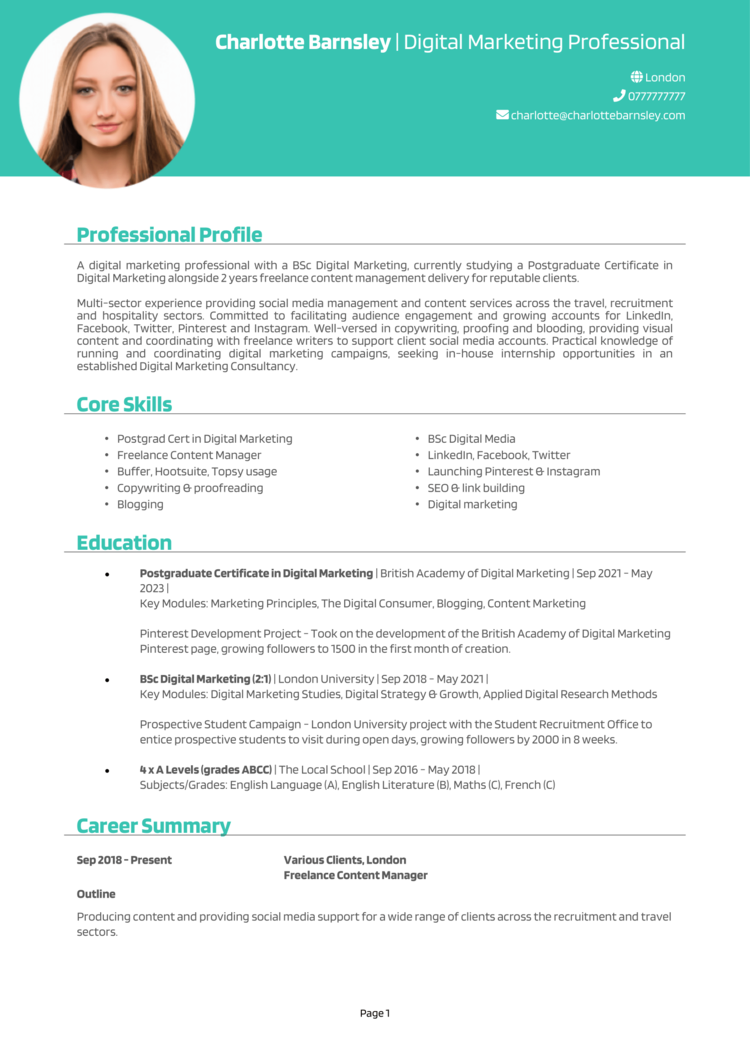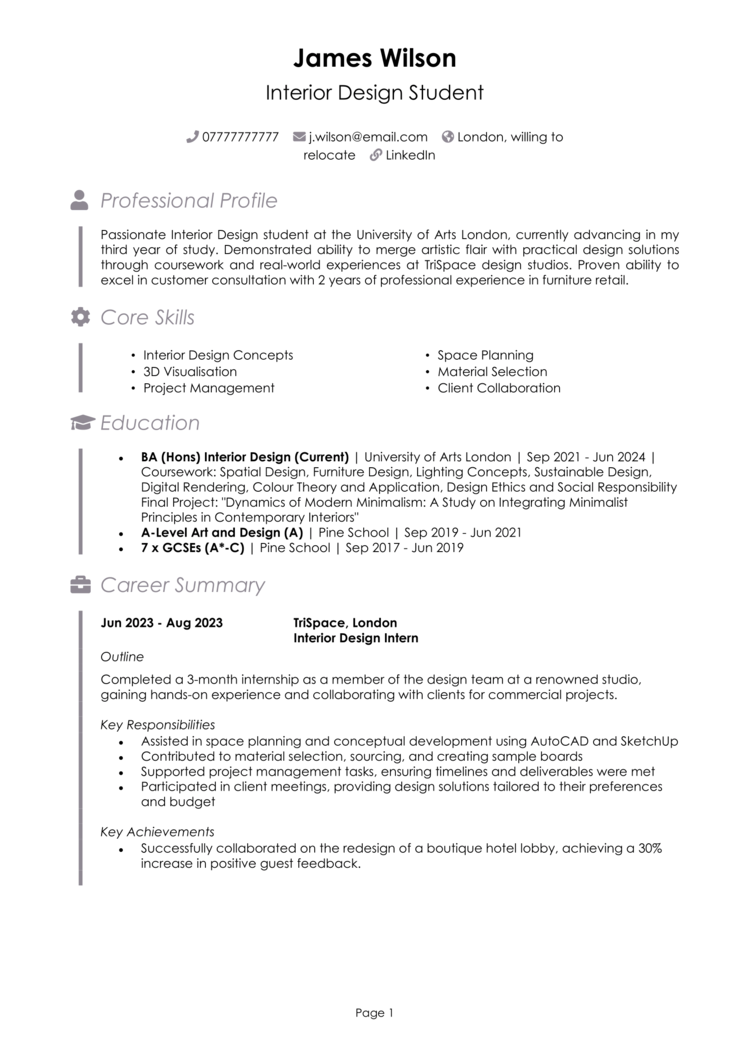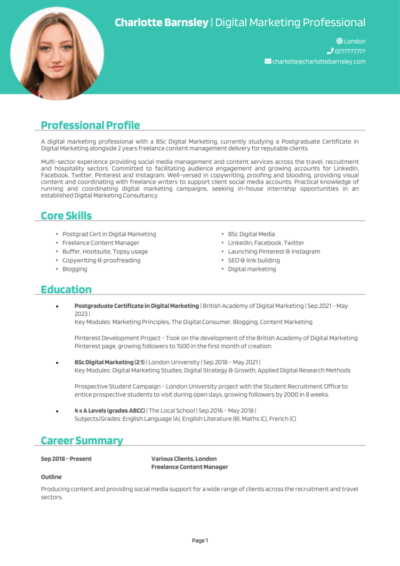An internship is your chance to take the first step into your dream career, but first, you need to land the opportunity. Whether you’re aiming for hands-on experience in your chosen industry or just looking to bulk up your CV, your application needs to stand out.
This guide, packed with Internship CV examples, will help with writing a CV that showcases your potential and lands you interviews. Let’s create a CV that gets your career off to a flying start.
Internship CV example

Student CV example

How to write your Internship CV
Learn how to create your own interview-winning Internship CV with this simple step-by-step guide.
Let’s be real – nobody’s expecting you to have a 10-page CV at this stage, but they will want to see what makes you worth mentoring – they’re looking for enthusiasm, transferable skills, and a willingness to learn. Your CV is your opportunity to show them you’re the ideal candidate to invest in.
In this guide, you’ll learn how to write a good CV that highlights your academic achievements, relevant projects, and personal drive. By the end, you’ll have an application that makes recruiters excited to have you on board.
How should you structure your Internship CV?


Your internship CV structure needs to be as polished as it is concise. A well-structured layout will ensure recruiters can quickly see why you’re a great fit for the role.
Here’s how to structure your Internship CV:
- Name and contact details – Make it easy for recruiters to reach you by placing contact details at the top. Including a picture of yourself is entirely optional.
- Profile – Start with a short summary of your goals, skills, and why you’re interested in the role.
- Core skills – Next, bullet point your key abilities that align with the internship, such as teamwork or research skills.
- Education – Focus on your academic achievements, relevant coursework, and key projects.
- Work experience – Include internships, part-time jobs, or voluntary work that demonstrates transferable skills.
- Additional info – You can optionally include hobbies and interests or awards that showcase creativity, leadership, or collaboration.
Internship CV format


Formatting your CV is like dressing for an interview – clean, professional, and nothing too over-the-top. Even if this is your first application, a clean, well-organised CV will show you’re serious about the opportunity: afterall, nobody wants to struggle through a CV format that looks like it’s been put together in the middle of an all-nighter.
Here’s how to format your Internship CV:
- Bullet points – Break down details to make them easy to scan and understand.
- Divide sections – Use clear headings to separate sections logically.
- Use a clean font – Ensure your CV is easy to read with a professional font.
- Keep it the right length – Stick to one or two pages – enough length to show your skills without overwhelming busy recruiters.
Internship CV profile


Your profile is your chance to make an immediate impression. This short paragraph should explain who you are, what you’re aiming for, and why you’d make a great intern. Convey the value you’d provide in your CV profile.
If you’re a junior candidate, or just want more space to detail your career aspirations, consider a personal statement instead: and definitely include a cover letter.
Internship CV profile examples
Profile 1
Ambitious Fashion Design student with a strong foundation in garment construction, fabric selection, and trend analysis. Developed skills through university projects and freelance design work, including creating mood boards, technical sketches, and prototypes. Proficient in Adobe Illustrator, Photoshop, and CLO 3D. Eager to contribute creativity and attention to detail to a dynamic fashion team.
Profile 2
Ambitious Business student with a strong academic foundation in business administration and practical experience in market research and data analysis. Gained experience through university projects and part-time roles, developing skills in Excel, Power BI, and report writing. Passionate about contributing to operational improvements and strategic planning in a corporate environment.
What to include in your Internship CV profile
Here are some tips on what to include in your Internship CV profile:
- Your current stage – Whether you’re a graduate or a school leaver, make a note of your current position.
- Relevant skills – Mention abilities that align with the role, like research, analysis, or communication.
- Academic highlights – Quickly note standout achievements or projects from your studies, including certificates or degrees.
- Work experience – If you have any past professional experience – great – make a note of it here.
- Your goals – Share your ambitions and what you hope to achieve from the internship.
Presenting your core skills


The core skills section of your CV is where you showcase your most relevant abilities. Even if you have no experience, focus on transferable skills that will impress recruiters.
For example, teamwork from group projects, organisational skills from event planning, or problem-solving from part-time jobs can all show your potential. Tailor your CV skills to the internship by matching it to the job description and using specific examples where possible.
Skills to include in an Internship CV
- Administrative Support – Assisting with day-to-day tasks such as scheduling, filing, and document preparation.
- Research Assistance – Conducting research and compiling data to support projects or reports.
- Project Coordination – Contributing to the planning and execution of team projects under supervision.
- Data Entry – Accurately inputting and managing data in spreadsheets or databases.
- Report Preparation – Creating and formatting reports or presentations using tools like Microsoft Office or Google Workspace.
- Event Assistance – Supporting the planning and execution of company events or meetings.
- Customer Interaction – Handling client communications, responding to queries, and providing basic support.
- Social Media Management – Assisting with content creation, scheduling posts, and tracking engagement.
- Task Prioritisation – Managing multiple assignments effectively to meet deadlines and maintain quality.
- Software Proficiency – Gaining hands-on experience with industry-specific tools and applications.
Highlighting your education


The education section is where you can shine as a candidate for an internship. Employers will look to your academic background to see what knowledge and skills you’re bringing to the table.
List your qualifications in reverse chronological order, starting with your most recent studies.
Include your degree, A-levels, or any other relevant qualifications. If you’re still in school or university, highlight coursework, research projects, or modules that relate to the internship. For example, mention a business strategy project for a marketing internship or lab experience for a research role.
Example education sections
Education 1
First Class BA (Hons) Marketing | University of Manchester | 2019–2022
Modules included Digital Marketing Strategy, Consumer Behaviour, and Branding. Completed a dissertation on the role of influencer marketing in driving consumer trust, achieving a first.
3x A-Levels (AAB) | Manchester Sixth Form College | 2017–2019
9x GCSEs (A*-C) | Manchester High School | 2015–2017
Education 2
Distinction BTEC Level 3 Extended Diploma in Business | Birmingham College | 2020–2022
Focused on Marketing Principles, Business Finance, and Customer Relationship Management. Produced a final project analysing the feasibility of launching a start-up business.
5x GCSEs (A*-C) | Birmingham High School | 2018–2020
What to include in your education section
For each qualification, add the following info:
- Qualification & organisation – Simply state what you studied and where you earned the qualification.
- Dates studied – Give the start and end year of your studies.
- Extra details – For your most recent and relevant qualifications, add some details about your studies to showcase some of the valuable skills and experience you gained. This could be projects, modules, coursework, essays, or anything else that could highlight relevant talents for the kinds of internship you’re applying for.
Best qualifications for Internships
- Undergraduate Degree (In Progress) – Demonstrates your dedication to learning and future career goals.
- A-Levels or Equivalent – Highlights academic achievement and readiness for further development.
- Certificate in Leadership Skills – Shows you’re proactive about developing workplace abilities.
- Technical or Software Training – Examples like Excel or Adobe Suite show your hands-on skills.
- Volunteering Experience Certificate – Demonstrates teamwork, initiative, and a desire to contribute.
Work experience


Your work experience section is where you prove you’ve already developed skills worth investing in. Even if you haven’t worked in the industry yet, think about roles, volunteer positions, or personal projects that demonstrate your abilities.
Start with your most recent experience and work backwards in reverse chronological order. Focus on transferable skills like communication, teamwork, or organisation.
If you’re new to the workforce, don’t sweat it – highlight things like university societies, charity work, or even independent projects.
How to structure jobs

- Outline – Briefly describe the organisation or role and how you contributed and fit in.
- Responsibilities – Highlight tasks that demonstrate transferable skills, like collaborating with a team, managing schedules, or problem-solving. Use action verbs such as “led,” “organised,” or “developed” to convey impact.
- Achievements – Mention measurable outcomes, such as increasing event participation or completing a project within a tight deadline. Numbers and tangible results show employers you can deliver.
Example work history for Interns
Fashion Design Shadowing | Threads Studio
Outline
Assisted the design team in developing seasonal collections, focusing on research, material selection, and prototype creation.
Responsibilities
- Researched fashion trends and created mood boards to guide the design direction for new collections.
- Prepared detailed technical sketches and CAD designs for garments.
- Supported the sample-making process by coordinating with pattern makers and seamstresses.
- Organised fabric swatches and trims to ensure efficient material selection.
- Maintained the design studio, ensuring all supplies and materials were properly catalogued.
Achievements
- Contributed to a capsule collection featured in a local fashion showcase.
- Improved sample development efficiency by introducing an organised material tracking system.
- Praised by the design team for exceptional attention to detail and innovative ideas.
Junior Business Analyst | Strategic Insights
Outline
Supported the consulting team by conducting market research and data analysis to inform strategic recommendations for clients.
Responsibilities
- Collected and analysed market data to identify industry trends and opportunities.
- Created detailed Excel dashboards to visualise key performance metrics for client presentations.
- Collaborated with team members to prepare reports summarising insights and recommendations.
- Researched competitors and industry benchmarks to inform client strategies.
- Supported the coordination of team meetings and presentations by ensuring timely delivery of materials.
Achievements
- Developed an interactive dashboard that reduced data reporting time by 20 percent.
- Contributed to a market analysis project that resulted in a client securing a £500k investment.
- Praised by supervisors for analytical skills and ability to communicate complex insights effectively.
Additional info


At the bottom of your CV is a section for optional, additional info: this could complement a junior CV very well.
Put anything that’ll help convey to recruiters how well you’ll fit, from relevant hobbies to awards.
Good additional info for internship applications
- Relevant hobbies – Mention activities that demonstrate traits like initiative, curiosity, or creativity. For example, blogging, coding personal projects, or running a podcast related to the field you’re entering.
- Volunteer experience – Include any charitable work or event participation that shows teamwork, dedication, or leadership potential.
- Extracurricular projects – Highlight coursework, university societies, or competitions you’ve joined that relate to your career goals.
- Online courses or certifications – If you’ve taken any self-led learning through platforms like Coursera or LinkedIn Learning, include it to demonstrate proactivity and commitment to growth.
- Language skills – Multi-lingual abilities are often a bonus for interns, as they may assist with research or client interactions in diverse environments.
Additional info
Hobbies and Interests
Blogging about tech trends – Sharing insights on emerging technologies, gaining skills in research, content creation, and SEO.
Photography – Capturing portraits and landscapes to refine creativity and attention to detail.
Volunteer Work
School outreach programme – Conducted workshops on career development, improving public speaking and mentoring skills.
Charity event planning – Helped organise fundraising events for a local shelter, managing logistics and promoting via social media.
Extracurricular Projects
University coding competition – Developed a mobile app prototype in a team of five, focusing on usability and functionality.
Business society treasurer – Managed a £5,000 annual budget, allocating resources for events and networking sessions.
Certifications and Training
Introduction to Data Analytics (Coursera) – Learned the basics of data visualisation and Python for analytics.
Fundamentals of Project Management (LinkedIn Learning) – Developed knowledge of project planning, scheduling, and resource allocation.





